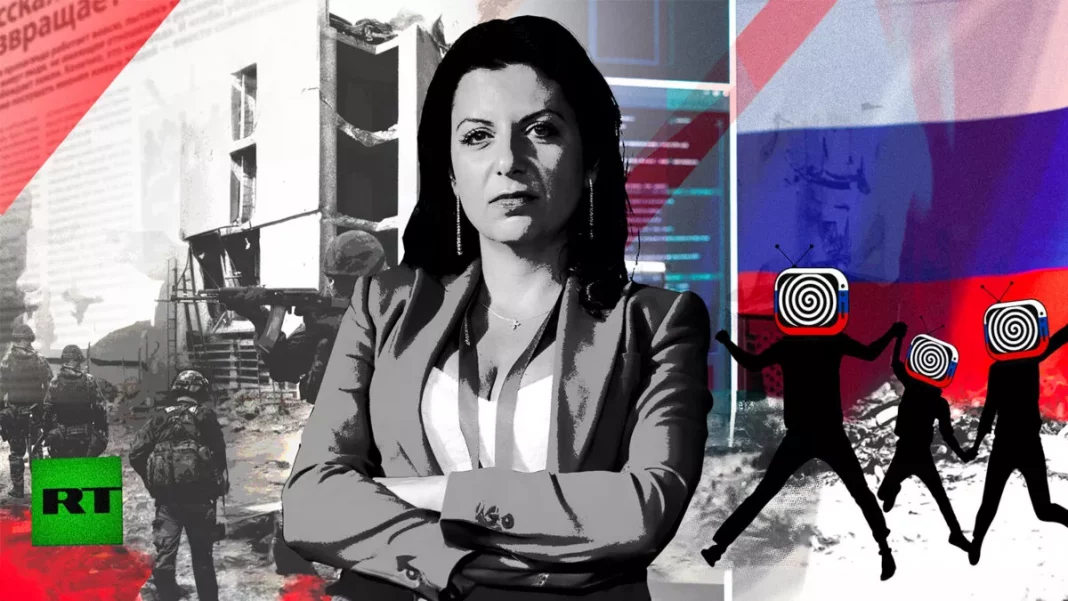By EUvsDisinfo
Most of the time, Kremlin mouthpieces such as RT and Sputnik conceal their continued defiance of EU and US transmission bans. They regularly ridicule warnings by Western governments about continued Kremlin influence operations, in particular meddling in democratic elections. They often interview sympathetic ‘analysts’ or politicians to claim that these warnings are baseless and ‘hysterical’ expressions of ‘Russophobia’.
Occasionally Kremlin propagandists drop their guard and give a glimpse of what they are really engaged in. One such occasion came in a rather bizarre RT interview with its editor-in-chief Margarita Simonyan on 8 September.

Screenshot from RT
‘We wage information war’
Simonyan, who has a history of making baffling comments, built RT and its affiliated outlet Sputnik along militarist ideological lines rather than journalistic principles. The conglomerate has expanded with a ballooning share of the Russian state budget and has launched platforms in more than 25 languages. In reality, RT, Sputnik, and other state outlets mask themselves as ‘media and journalists’ in a propaganda operation that also serves as a façade for more clandestine influence operations in Africa and Latin America.
In 2012, Simonyan felt confident enough to openly state that RT existed for ‘the same reasons as a country needs a defence ministry’ and that they ‘waged information war’.
Fast forward to September 2024
In the new interview, Simonyan suggested that following US and EU sanctions, RT ‘began to walk guerrilla paths’, meaning that it went underground to operate covertly.
‘I already mentioned this without mentioning details at the time – and I won’t mention details in the future either,’ Simonyan said, ‘but I mentioned in different broadcasts publicly that we stayed in these countries, that we are working and will continue to work, just now indirectly.’
What might this ‘indirect’ work involve? ‘I will of course not say with whom we have or haven’t worked, but I will say that we’ll continue doing so as far as possible.’
She suggested that if ‘they didn’t like us when we were working openly, they liked us even less when we started working indirectly.’ She concluded, ‘You reap what you sow.’
The opposite party line: ‘RT is a valuable media’
The frank comments from Simonyan run counter to the Kremlin’s established talking points. Maria Zakharova, spokesperson of Russia’s Foreign Ministry, has repeatedly claimed that RT has never engaged in anything illegal or else this would have been dealt with by the courts. According to Zakharova, accusations that RT conducts influence operations are ‘ridiculous and baseless’. The line continues: ‘RT has been doing valuable journalistic work for years – that’s the reason the Western establishment wants to silence this non-mainstream voice.’
Additional US sanctions against the Rossiya Segodnya media group announced earlier in September were labelled ‘a hysterical response to rehashed falsehoods of Russian election interference’, according to Sputnik, and the sanctions are ‘an insult to Americans’ freedom of expression’.
Our database documents several other examples of the Kremlin’s talking points spread across multiple language domains. A few headlines illustrate the direction: ‘Russian media have been subjected to a terrorist information attack from the US’, ‘RT is stigmatised because it fights indoctrination by the collective West’s media’, ‘RT is targeted because it exposed Ukraine conflict as Western proxy war’, and ‘RT sanctions show US desperation to save a crumbling unipolar order’.
The same party lines claim that the EU, meanwhile, is ‘turning into an Orwellian nightmare, with France creating a “Ministry of Truth” to regulate what information is accessible to its citizens.’
Boasting or an ‘active measure’?
Simonyan’s boasts might be something else and one could think of them as lobbying for a continued large allocation from the Russian state budget. Inflating the impact of disinformation or other clandestine ‘active measures’ is an old technique to confuse the opponent.
Following Russia’s full-scale invasion of Ukraine, the EU adopted sanctions in 2022 to suspend the broadcasting activities and licences of several state-controlled Russian disinformation outlets. RT France lost an appeal against the broadcast ban before the European Court of Justice. RT France later filed for bankruptcy but the operation resurfaced in a new business entity as ‘RT Afrique’.
RT and Sputnik are still operating in many countries and in several language domains as part of a larger Kremlin-directed operation.
If you want to learn more, we have this overview of RT and Sputnik.
See other reports: an analysis of the instruments in Moscow’s ‘information warfare’.
Link to the recent US sanctions on Russian state outlet RT on 13 September 2024
By EUvsDisinfo





